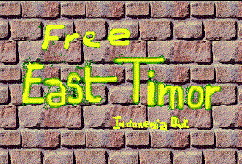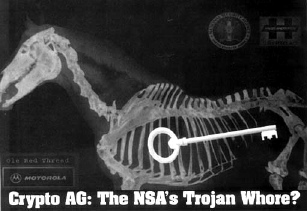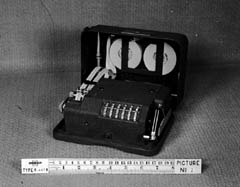lambda 5.02 / 18 mai 1999
ShortCuts
|

&laqno; An Internet service provider in Dublin, Ireland, a couple
weeks ago was forced to shut down temporarily after a cyberattack on its
computers. Topping the list of suspects is Indonesia. The Internet company
was hosting a ''virtual nation'' on
behalf of people who want to end the brutal Indonesian occupation of East
Timor, the eastern half of a South Pacific island the size of Massachusetts.
In late 1997 Connect-Ireland joined forces with Nobel laureates Jose Ramos-Hort
and Bishop Carlos Belo. The idea behind their East Timor Project was to
create what amounted to a virtual nation. To do this, they took advantage
of the way Internet domains are created, and succeeded to obtain the country
code domain "tp". Creating an
East Timor TLD effectively established a semiofficial presence. An Indosesian
spokesman told the Irish Times newspaper, that the government was "concerned
that this freedom has been misused ... to spread a campaign against Indonesia. »
o Source: Repressive regimes may be targeting Net service
providers. 02/09/99. By Dan Gillmor / San Jose Mercury News.
o Lambda 4.03 |
EuroTaps
The European Parliament voted on May 7 a series of amendments to
harmonize wiretapping schemes in the 15 members of the EU. It would give
the capacity of euro-police forces to exchange snooping capability for mobile
and internet communications.

o Telepolis,
German magazine and Enfopol sentinel (ge)
o Le
Monde Diplo, avril 99 (fr)
o ZDNet, edition du
15 mai 1999 (fr)
o Lambda 3.02 April 97 (en) |
Contents 5.02
HISTORY: Crypto AG / NSA - was the famous Swiss locksmith an agent for
the NSA? From a Covert Action Quaterly article.
TECHNO: Microsoft's security flaws and PR mechanics. Wintel's Sniper
Snoops breached EU directives.
Plus : Filterfanatics + Crypto Updates.
Archives
- Search
Switzerland's Crypto A.G.
The NSA's secret locksmith?

The Canadian Covert Action Quaterly
recently published the secret
history of Crypto AG (cover above), in which a Swiss encryption company
is described to have been totally manipulated by the US National Security
Agency and its equivalent in West Germany (BND) for almost four decades.
It helped the NSA to learn a lot in the Middle East, where all major nations
(including those, like Iran, who were arch enemies of the US) acquired Crypto
AG untrustful products.
Abstracts:
&laqno; For decades, the US has routinely intercepted and deciphered
top secret encrypted messages of 120 countries. These nations had bought
the world's most sophisticated and supposedly secure commercial encryption
technology from Crypto AG, a Swiss company that staked its reputation and
the security concerns of its clients on its neutrality. The purchasing
nations, confident that their communications were protected, sent messages
from their capitals to embassies, military missions, trade offices, and
espionage dens around the world, via telex, radio, teletype, and facsimile.
(...) All the while, because of a secret agreement between the National
Security Agency (NSA) and Crypto AG, they might as well have been hand
delivering the message to Washington. Their Crypto AG machines had been
rigged so that when customers used them, the random encryption key could
be automatically and clandestinely transmitted with the enciphered message.
NSA analysts could read the message traffic as easily as they could the
morning newspaper.
...
&laqno; A document released in 1995 by Britain's Public Records
Office indicates that Switzerland and NATO concluded a secret deal in 1956.
The "Top Secret" document, dated February 10, 1956, with the
reference "prem 11/1224," was written by the famous British World
War II figure, Field Marshal Bernard L. Montgomery. While "Monty"
was a vice-commander of NATO, he discussed a secret alliance with Swiss
Defense Minister Paul Chaudet. In peacetime, Switzerland would be officially
neutral, but in wartime, it would side with NATO. ... »
 One of Crypto AG's smart cipher appliance
One of Crypto AG's smart cipher appliance
The cover-up ended in March 1992, the author Wayne Madsen explains how
the Iranian intelligence succeeded to find the Trojan Horse out after the
"1991 assassination in Paris of former Iranian Prime Minister Shahpour
Bakhtiar."
"On August 7, 1991, one day before Bakhtiar was found dead
with his throat slit, the Teheran headquarters of the Iranian Intelligence
Service, VEVAK, transmitted a coded message to Iranian diplomatic missions
in London, Paris, Bonn, and Geneva, inquiring "Is Bakhtiar dead?"
The Iranians concluded from Western press reports that British and American
SIGINT operators had intercepted and decoded the message (as reported by
L'Express of Paris) and knew that Teheran was behind the assassination.
They realized that their code had been broken, looked to their Crypto AG
cipher machines... ."
People aware of the Promis software - another bugged software (by a DOJ-CIA
cover-up, used to spy on European allies in the 80's - should not be surprised
at all.
o See also,
in the same issue of Covert Action, a reminder of Nicky Hager's book Secret
Power about the Echelon surveillance network.
SNIPER

SNOOPERS
Everybody knows that Intel and Microsoft were accused some weeks ago
of privacy misconducts for their hidden functions inside the Pentium III
chip and Office 98 registration process. After apologies, what could we
expect of a lawsuit?
Lambda learned that the French data protection agency CNIL launched an
investigation to find out if Wintel had violated European directives regarding
private data protection online. The inquiry goes on, told the Lambda a CNIL
official on May 15th. Back earlier this year, on February 23, the Data Protection
Working Party (European Commission's DG-XV) published two "recommendations"
o Processing
of Personal Data on the Internet;
o Invisible
and Automatic Processing of Personal Data on the Internet Performed by Software
and Hardware.
All these framework was inspired by the 1995 and 1997 European directives that
came into law in the EU last October.
Here's some abstracts of what Intel and Microsoft ignored:
&laqno; The Working Party encourages the software and hardware
industry to work on Internet privacy-compliant products that provide the
necessary tools to comply with the European data protection rules.
"A condition for legitimate processing of personal data is
the requirement that the data subject is informed and thus made aware of
the processing in question. Therefore, the Working Party is especially
concerned about all kinds of processing operations which are presently
being performed by software and hardware on the Internet without the knowledge
of the person concerned and hence are "invisible" to him/her.
"Typical examples of such invisible processing are the "chattering"
at the HTTP level, automatic hyperlinks to third parties, active content
(like Java, ActiveX or others client based scripting technologies) and
the cookies mechanism as currently implemented in the common browsers.
"Internet software and hardware products should provide the
Internet users information about the data that they intend to collect,
store or transmit and the purpose for which they are necessary.
"Internet software and hardware products should also give the
capacity to the data user to easily access any data collected about him/her
at any later stage. »
o Check also about the US'99 Orwells
- Big Brother Awards who have been bestowed on April 7 (see 4.03
for the 98 UK Edition).
==================
o CLOSED OFFICE o
==================
The March
issue of Bruce Schneier's "Crypto-Gram" we noticed
a short notice, providing "further proof, if you needed it, that Microsoft
prefers to treat security holes as a public relations problem, rather than
fixing the actual problem":
&laqno; In December 1997, David Foster discovered
a security hole in Office 97. This bug allows any Web page to contain executable
code that will run without warning on the user's machine. For anyone who
knows Word and VBA (Word 97's macro language), the problem is obvious.
" Foster went to the bug reporting Web pages
for Internet Explorer and Word, and reported the problem. There was no
response from Microsoft. In late 1998, he discovered that not only had
MS still not fixed the problem in Word 97, but the bug also existed in
the beta version of Word 2000. He posted a further message to Microsoft,
and received the following: "Microsoft appreciates your input regarding
this issue, however in lieu of modern technology being what it is, we all
need to be personally responsible for knowing what we are downloading off
the internet." In case it's not immediately obvious, this is arrant
nonsense.
" It wasn't until Woody Leonhard, Word guru and
Office 97 iconoclast, heard about the problem and threatened to publish
particulars of the security hole in the next issue of "Woody's Office
Watch," with a readership of 140,000, that Microsoft finally did something.
With that incentive, Microsoft had a patch available on their Web site
within days. »
o David Foster's story
of the bug
FILTER FANATICS
UPDATE
From the Wall Street Journal. May 6, 1999
... SurfWatch, an Internet-filtering company that aims to protect
children from online pornography and violence, boasts that it only blocks
objectionable sites after "thoughtful analysis" by its staff.
This left James Tyre, a Pasadena lawyer and Internet activist opposed to
filtering, more than a little bemused when SurfWatch blocked his newly
registered site, www.plugandpray.com for "sexually explicit content."
[The software confused Mr. Tyre's site with a pornography site that shares
the same IP number]. ... Martin Minow, a silicon valley programmer, recently
discovered that his new site www.minow.org, was also blocked by SurfWatch
for alleged explicit content. The site bears only the words, "This
site is under construction."
From The Censorware Project, March 23:
&laqno; The Censorware Project released his report, "Censored Internet Access in
Utah Schools and Libraries". (It) examines the state of Utah's
use of a commercial internet censoring product in all Utah public schools
and some public libraries, as recorded in the log files generated by the
software itself.
"The log files prove incriminating - they reveal that Utah
students are highly unlikely to use the internet for non-scholastic purposes,
and that when students or adults are banned from a site by the software,
more likely than not, the site was completely innocent.
"Among the documents banned by Utah: the Holy Bible, the Book
of Mormon, the Declaration of Independence, the United States Constitution,
all of Shakespeare's plays, and The Adventures of Sherlock Holmes."
Meanwhile in France, some universities are using filtering technology
from the US to block 'non-academic' content. See for example in Toulouse
(SquidGuard software + Berkeley Database), where network operators are quoting
the Penal Code to justify their "right" to blindfully discriminate
between "good" and "bad" content.
o See also lambda 4.01
CRYPTO UPDATE


FRENCH CONNECTION: The new French decrees expressing the government's
will to soften encryption policy were
published on March 28:
The legal level of key length that any one can use rose from 40-bit to
128-bit, the plans for a trusted-third-party-based recovery scheme were
abandoned, and a new law that should free all crypto systems should follow,
the governement said.
But an industry group called AFUU (French
Group of Unix Users, www.afuu.fr)) said afterward that the new rules are
a good step but still ask software publishers to get a licence ("declaration
prealable") and to furnish a complext factbook about their cipher systems,
if they want to trade freely with privacy-enhanced consumers.
"These obligations have no equivalence anywhere among our main
trading and politic allies. ... It would be a bad thing if crypto products
which are international standards are not still allowed in France, or are
allowed about six month after its worldwide launch."
o Décret
n° 99-199 du 17 mars 1999 définissant les catégories
de moyens et de prestations de cryptologie pour lesquelles la procédure
de déclaration préalable est substituée à celle
d'autorisation.
o Décret
n° 99-200 du 17 mars 1999 définissant les catégories
de moyens et de prestations de cryptologie dispensées de toute formalité
préalable.
The privacy watchdog EPIC was enthousiastic after the Appeals
verdict of Daniel Bernstein case's.
"The U.S. Court of Appeals for the Ninth Circuit ruled on May
6 that federal regulations that prohibit the dissemination of encryption
source code violate the First Amendment. The court found that the regulations
are an unconstitutional prior restraint on speech because they "grant
boundless discretion to government officials" and have "effectively
chilled [cryptographers] from engaging in valuable scientific expression."
The case was initiated by researcher Daniel Bernstein, who sought government
permission to export source code he had written."
Further comments by the Ninth Circuit were seen as a support for encryption
as a weapon to protect privacy:
... &laqno; Whether we are surveilled by our government,
by criminals, or by our neighbors, it is fair to say that never has our
ability to shield our affairs from prying eyes been at such a low ebb.
The availability and use of secure encryption may offer an opportunity
to reclaim some portion of the privacy we have lost. Government efforts
to control encryption thus may well implicate not only the First Amendment
rights of cryptographers intent on pushing the boundaries of their science,
but also the constitutional rights of each of us as potential recipients
of encryption's bounty. . . . [I]t is important to point out that Bernstein's
is a suit not merely concerning a small group of scientists laboring in
an esoteric field, but also touches on the public interest broadly defined. ... »
Meanwhile in Australia, a short report that has not been fully
verified said that RSA opened an Australis office, staffing with with well
known SSLeay developers. "Australia's Defence Department had awarded
Security Dynamics a licence -- thought to be the first of its type in Australia
-- to export uncrackable, commercial versions of SSLeay from the Brisbane
centre, and Security Dynamics would use the office as its global export
centre for SSL technology, bypassing US military bans."
FreeS/WAN - A free IPSEC crypto system for extranets. From Salon
Magazine, 19 April 99:
On April 14th, the Internet took a giant step toward such a future
after the release of FreeS/WAN
1.0, a free software program aimed at facilitating the secure encryption
of data on the Net. It's the brain-child of two libertarian philanthropists,
at least one of whom, John Gilmore, has long advocated using encryption
to resist government intrusions.
As it stands now, FreeS/WAN is designed to run on a computer inserted
between a local area network and the Internet. It also requires, according
to FreeS/WAN programmer Henry Spencer, "prearrangement" with
another network running the software for it to work. But Spencer predicts
that FreeS/WAN functionality will eventually be included in software that
can run on a single user's computer.
The FreeS/WAN software was written outside of the United States,
primarily in Canada, in order to get around U.S. laws that forbid the export
of powerful encryption tools. Could the software be, eventually, a tool
for making such laws meaningless? That's certainly the hope of its designers.
Although not all citizens of cyberspace may regard this sort of crypto-libertarian
utopia as the ideal future society, such a future certainly seems more
plausible now.
o SALON
piece
lambda / arQuemuse
avril-mai 1999
Réactions
I Home

 One of Crypto AG's smart cipher appliance
One of Crypto AG's smart cipher appliance